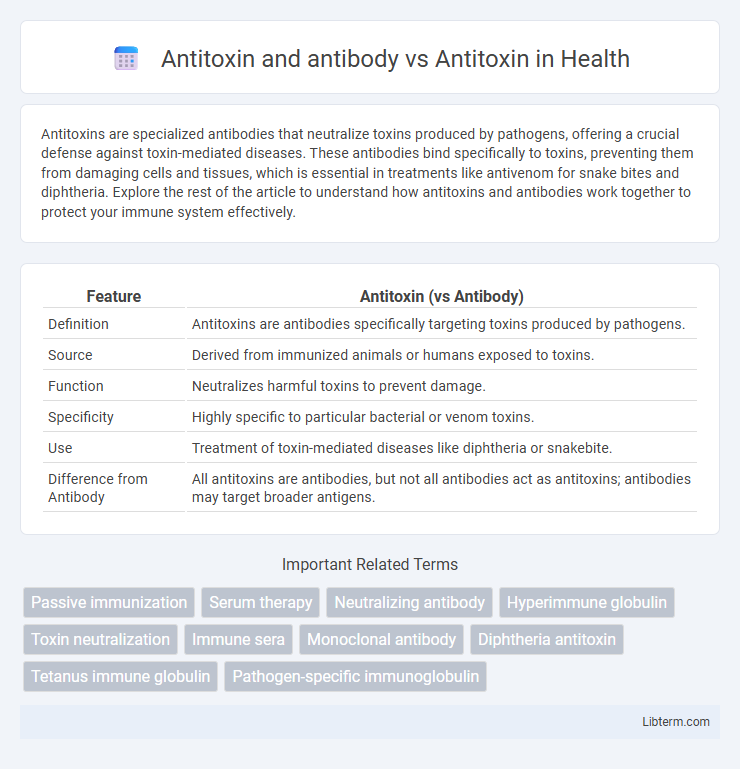Antitoxins are specialized antibodies that neutralize toxins produced by pathogens, offering a crucial defense against toxin-mediated diseases. These antibodies bind specifically to toxins, preventing them from damaging cells and tissues, which is essential in treatments like antivenom for snake bites and diphtheria. Explore the rest of the article to understand how antitoxins and antibodies work together to protect your immune system effectively.
Table of Comparison
| Feature | Antitoxin (vs Antibody) |
|---|---|
| Definition | Antitoxins are antibodies specifically targeting toxins produced by pathogens. |
| Source | Derived from immunized animals or humans exposed to toxins. |
| Function | Neutralizes harmful toxins to prevent damage. |
| Specificity | Highly specific to particular bacterial or venom toxins. |
| Use | Treatment of toxin-mediated diseases like diphtheria or snakebite. |
| Difference from Antibody | All antitoxins are antibodies, but not all antibodies act as antitoxins; antibodies may target broader antigens. |
Understanding Antitoxins: Definition and Mechanism
Antitoxins are specific antibodies produced by the immune system or artificially created to neutralize toxins released by bacteria, effectively preventing toxin-induced damage. Unlike general antibodies that target a wide range of pathogens, antitoxins specifically bind and inactivate bacterial toxins such as those from diphtheria or tetanus. The mechanism involves the antitoxin's ability to recognize toxin molecules, blocking their interaction with host cells and thereby neutralizing their harmful effects.
What Are Antibodies? Structure and Function
Antibodies are Y-shaped glycoproteins produced by B cells that specifically recognize and bind to antigens, neutralizing pathogens or marking them for destruction by the immune system. Their structure consists of two heavy chains and two light chains forming variable regions at the tips that determine antigen specificity, and constant regions that mediate immune effector functions. Unlike antitoxins, which are antibodies specifically directed against toxins, antibodies encompass a broader range of immune responses targeting various antigens, including viruses, bacteria, and other foreign molecules.
Antitoxin vs Antibody: Key Differences
Antitoxins are antibodies specifically produced to neutralize toxins secreted by bacteria, while antibodies are broader immune proteins that recognize and bind to various antigens, including pathogens and foreign substances. Antitoxins are a subset of antibodies targeting toxins, often used therapeutically to treat toxin-mediated diseases like diphtheria and tetanus. The key difference lies in their specificity: antitoxins neutralize toxins directly, whereas antibodies can target a wide range of antigens for immune defense.
The Role of Antitoxins in Neutralizing Toxins
Antitoxins play a critical role in neutralizing toxins by specifically binding to and inactivating harmful bacterial toxins, preventing them from damaging host cells. While antibodies are a broad class of immune proteins targeting various antigens, antitoxins are specialized antibodies designed to counteract toxin activity directly. This targeted neutralization is essential in treatments for diseases such as diphtheria and tetanus, where rapid toxin neutralization can prevent severe tissue damage and systemic effects.
How Antibodies Combat Pathogens
Antibodies target specific antigens on pathogens, neutralizing toxins and marking invaders for destruction by immune cells, effectively enhancing the body's defense against infections. Unlike antitoxins, which are specific antibodies produced to neutralize particular bacterial toxins, antibodies encompass a broader immune response, including pathogen recognition and activation of phagocytosis. This targeted mechanism allows antibodies to bind directly to pathogens, preventing their attachment to host cells and facilitating their removal.
Medical Applications of Antitoxins
Antitoxins are specific antibodies used in medical treatments to neutralize toxins produced by bacteria, such as those causing diphtheria and tetanus. Unlike general antibodies, antitoxins target and bind directly to these toxins, preventing cellular damage and facilitating toxin removal from the body. Their application in passive immunization provides rapid protection against toxin-mediated diseases, making them crucial in emergency care and outbreak control.
Clinical Uses of Antibodies
Antibodies are clinically used for passive immunization against infectious diseases, targeting specific pathogens with high precision to neutralize toxins, viruses, or bacteria. In contrast, antitoxins are antibody preparations specifically designed to neutralize toxins produced by certain bacteria, such as diphtheria or tetanus toxins. The broader clinical application of antibodies includes monoclonal antibodies for cancer therapy, autoimmune diseases, and viral infections, offering targeted treatment beyond the scope of traditional antitoxins.
Production of Antitoxins and Antibodies
Antitoxins are produced by immunizing animals with specific toxins, leading to the generation of polyclonal antibodies that neutralize the toxin's effect. Antibodies, in contrast, can be produced through hybridoma technology to create monoclonal antibodies with high specificity for targeted antigens. Production of antitoxins relies on in vivo immunization and serum extraction, while antibody production often involves cell culture and recombinant methods enabling large-scale, consistent yields.
Limitations and Challenges: Antitoxin vs Antibody
Antitoxins, derived from animal sera, carry risks such as allergic reactions and limited specificity compared to antibodies, which are more targeted and human-compatible but may have high production costs and require sophisticated technology. Antitoxins often face challenges in stability and batch variability, while antibodies, especially monoclonal types, can encounter difficulties in cross-reactivity and immune escape by pathogens. Both treatments require careful consideration of efficacy, safety, and scalability when applied clinically for toxin-neutralization.
Future Prospects in Antitoxin and Antibody Therapies
Future prospects in antitoxin and antibody therapies emphasize advanced monoclonal antibody engineering to enhance specificity and reduce immunogenicity. Emerging techniques such as phage display and CRISPR-based antibody design accelerate the development of tailored antitoxins with improved efficacy against evolving toxins. Integration of nanotechnology and sustained-release formulations is poised to revolutionize delivery systems, enabling targeted treatments with prolonged therapeutic effects.
Antitoxin and antibody Infographic

 libterm.com
libterm.com